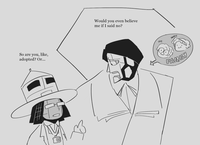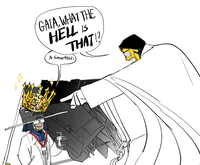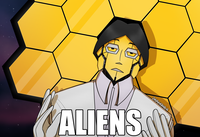James Webb (JWST)
R_J_Waaaaa
- Created
- 2 years, 4 months ago
- Creator
- R_J_Waaaaa
- Favorites
- 44
Profile
| "December 24, 2021: Webb Space Telescope - Launch" by Sleeping At Last | |
| "Beryllium Mirrors" by Rainbow Electric | |
| "Looking Back" written by Gary Ferguson, David Zabalaoui and Jeff Grant, performed by the "29th Street Band" (Dave Goldstein, Darren Halford, and Garland Campbell) |
| COSPAR IDSATCAT № | 2021-130A 50463 |
| Launch Date | December 25, 2021 |
| Name/s | James Webb Space Telescope (JWST), Next Generation Space Telescope (NGST) (formerly) |
| Agency | NASA, ESA, CSA |
| Nationality | American (United States of America), European (Austria, Denmark, United Kingdom, etc. [+9 more]), Canadian |
| Height | ≈14-20 metres (≈46-70 feet) |
Mirrors | Around 6 metres across (not including the backplane), it sits on his head at a variable 50 degrees and resembles a hat brim. |
| Mass | 6500 kilograms (14,300 lbs) |
| Power Source | Solar array |
| Occupation | Infrared Observatory |
Mission and Science Themes | JWST's primary aim is to shed light on our cosmic origins: it will observe the Universe's first galaxies, reveal the birth of stars and planets, and look for exoplanets with the potential for life. It will complement and extend the discoveries of the Hubble Space Telescope, with longer wavelength coverage and greatly improved sensitivity. Early Universe Webb will be a powerful time machine with infrared vision that will peer back over 13.5 billion years to see the first stars and galaxies forming out of the darkness of the early universe. Galaxies Over Time Webb's unprecedented infrared sensitivity will help astronomers to compare the faintest, earliest galaxies to today's grand spirals and ellipticals, helping us to understand how galaxies assemble over billions of years. Stellar Lifecycle Webb will be able to see right through and into massive clouds of dust that are opaque to visible-light observatories like Hubble, where stars and planetary systems are being born. Other Worlds Webb will tell us more about the atmospheres of extrasolar planets, and perhaps even find the building blocks of life elsewhere in the universe. In addition to other planetary systems, Webb will also study objects within our own Solar System. |
| Personality | Prideful, poised, dramatic, distinguished, mature, and adept, though slightly wishy-washy. Webb is nicer than he looks. Webb is a cautious fellow who tends to put everything on hold over the smallest of issues. And despite being, quite literally, made for his job, he's still getting accustomed to life in space now that he's out of the cleanroom for the first time in forever. He’s very capricious, an extroverted introvert if you may. While he never backs down from showing off in the spotlight, he'll spend just as much time cherishing his moments alone. He has exceptionally high standards and likes to take himself very seriously, almost to the point of thespianism. He’s a huge clean freak and procrastinates a lot, but would never admit to it. |
| Likes | Cleanliness, professionalism, posting photos of himself and his observations, personal space, the cold, being the centre of attention. |
| Dislikes | Dust and dirt, being rushed. |
| Fast Facts |
|
"Perfection takes time!"
Webb is the world's latest premier observatory and Hubble’s protégé. Coming from a long line of storied spacecraft gives him some pretty big shoes to fill!
He takes great pride in his reputation and line of work, yet all that potential gets frequently overshadowed by his infamous habit of backing out of things last-minute and being an overall pushover. Luckily, he's mostly gotten past it, and has since proven himself a reliable, beloved, big-name celebrity amongst fellow spacecraft, all while being a relatively new face in the cosmic scene.
- His infrared vision is theoretically sharp enough to see a bee on the Moon and allows him to peer into the universe as it was over 13.6 billion years ago.
- He takes the crown for the biggest and most powerful space telescope ever created—almost doubling the previous record (Herschel), but with his large frame some odd compromises had to be made
so that he could actually fit in a goddamn rocket fairingfor the sake of functionality, so he looks very avant-garde for an observatory; with foldable, golden mirrors of hexagonal beryllium and a giant sun shield to boot, you could mistake him for an art piece. - Also he can also shoot cryogenic lasers from his eyes because I thought it'd be funny.
View More
Recent Images






Comments